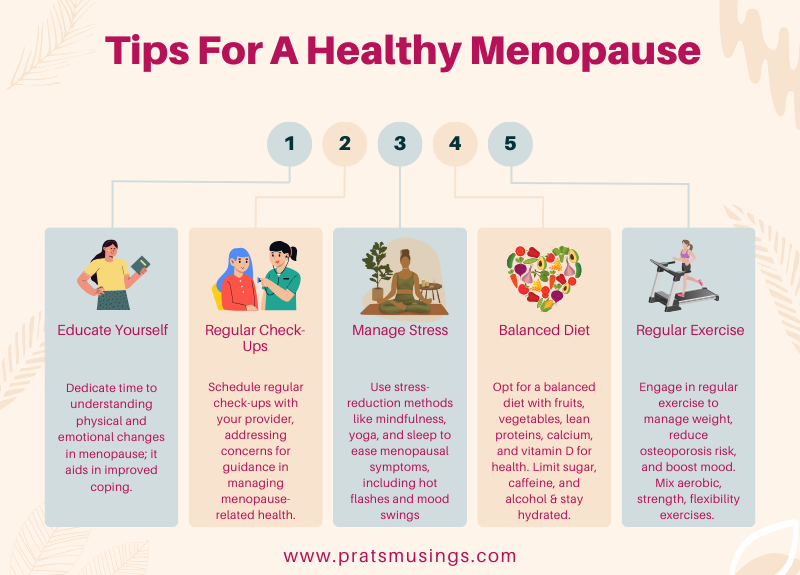World Menopause Day is observed on October 18 to raise awareness about menopause and its impact on women’s health and to promote support and resources for women going through this life stage. The theme for World Menopause Day 2023 is Cardiovascular Disease. Let’s look at some tips for a healthy menopause.
What is menopause?
Menopause is a natural biological process that marks the end of a woman’s reproductive years. It typically occurs in their late 40s or early 50s and involves a gradual reduction in the production of hormones, particularly estrogen.
This transition can lead to a range of physical and emotional symptoms, such as hot flashes, mood swings, sleep disturbances, and changes in bone density.
In 2009, the International Menopause Society (IMS), in partnership with the World Health Organization (WHO), emphasized the importance of dedicating a day to raising awareness about menopause. The primary objective of this day is to educate individuals, not limited to women alone, about menopause and the associated physical and emotional changes it entails.
What are some of the menopause symptoms?
While the symptoms can vary for many women, some of the common symptoms of menopause can include the following:
- Hot flashes: Sudden, intense heat sensations, often accompanied by sweating.
- Weight gain: Increased abdominal fat and changes in body composition.
- Mood swings: Emotional fluctuations, including irritability, anxiety, and depression.
- Night sweats: Excessive perspiration during sleep, leading to disrupted sleep patterns.
- Urinary changes: Increased frequency, urgency, or urinary incontinence.
- Vaginal dryness: Reduced lubrication, leading to discomfort and potential pain during intercourse.
- Changes in libido: Decreased interest in sexual activity for some women.
- Bone density loss: Increased risk of osteoporosis and fractures due to reduced estrogen levels.
- Irregular periods: Menstrual cycles become unpredictable and eventually cease.
- Sleep disturbances: Difficulty falling asleep or staying asleep, often leading to fatigue.
Tips to Maintain a Healthy Menopause

Maintaining good health during menopause is vital to ease the transition and manage the associated changes. Here are some menopause tips that you can follow.
Educate Yourself
Take the time to learn about the physical and emotional changes associated with menopause. Understanding what’s happening to your body can help you cope better.
Recommended: Some books to educate yourself on menopause.
Hormone Therapy
To alleviate severe menopausal symptoms, actively discuss hormone replacement therapy (HRT) as a potential option with your healthcare provider. Your doctor may recommend HRT for some women, but you must assess the benefits and risks together and explore alternative treatments.
Regular Check-Ups
Arrange periodic check-ups with your healthcare provider to oversee your overall health throughout and after menopause. Initiate discussions about any concerns or symptoms you might encounter to obtain suitable guidance and medical advice.
What are the alternative treatments available for menopause symptoms besides hormone replacement therapy?
Balanced Diet
To maintain a healthy body, prioritize a balanced and nutritious diet that includes an abundance of fruits, vegetables, whole grains, lean proteins, and low-fat dairy products. Ensure that your diet includes foods that are rich in calcium and vitamin D to promote bone health. Restrict your consumption of sugary and processed foods, caffeine, and alcohol. Prevent dehydration, which can exacerbate symptoms like hot flashes and dry skin, by consuming ample water.
Regular Exercise
Regularly participate in physical activity to effectively manage your weight, decrease the likelihood of osteoporosis, and enhance your mood. Integrate aerobic exercises, strength training, and flexibility exercises into your schedule. Strive to achieve a minimum of 150 minutes of moderate-intensity exercise or 75 minutes of vigorous-intensity activity each week.
Manage Stress
Practice stress-reduction techniques such as mindfulness, yoga, meditation, or deep breathing exercises to alleviate menopausal symptoms like hot flashes and mood swings. Ensure you get enough sleep, as sleep disturbances are common during menopause.
Prioritize Sleep
Sleep disturbances are common during menopause. Create a bedtime routine and a comfortable sleep environment to promote restful sleep.
Focus on Self-Care
Make time for self-care activities that make you feel good. Focusing on self-care can include hobbies, relaxation, and spending quality time with loved ones.
Practicing self-care, reducing stress, getting adequate sleep, eating a balanced diet, and eating well as alternative treatments besides HRT can work for some.
Other tips that doctors recommend:
- Engage in regular exercise to promote overall well-being.
- Maintain a moderate weight to reduce the risk of heart disease and diabetes.
- Avoid meal skipping and maintain a diet rich in meat, fish, eggs, legumes, and nuts.
- Ensure you consume at least 8-12 glasses of water daily to stay adequately hydrated.
- For health benefits, include antioxidant-rich foods such as berries, melons, and guava.
- Refrain from consuming caffeine, alcohol, and foods high in excessive sugar or spiciness.
- Incorporate foods abundant in Vitamin D and calcium to support bone health into your diet.
- Incorporate phytoestrogen-rich foods like flax seeds, sesame, tofu, and soy products into your diet.
On this #WorldMenopauseDay, I thought I should share these tips for easing into healthy menopause. After all, taking charge of our health should be a priority.
Great post! My mum has been suffering through this, I’ll be relaying many of these to her and of course, keep them in mind for myself in the future!